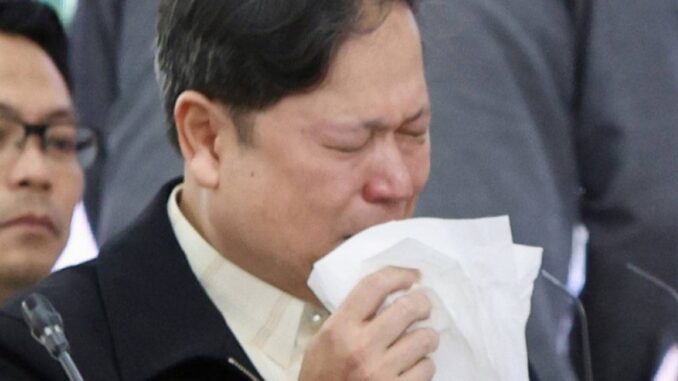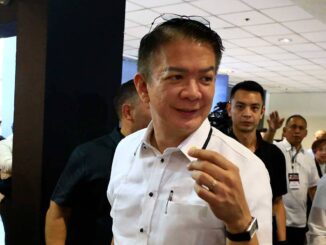
FORMER Iloilo City mayor Jed Patrick Mabilog told a congressional panel Thursday he was not the drug protector that former president Rodrigo Duterte made him out to be in 2017.
He also told the quad committee of a plot to have him implicate opposition leaders led by former Senate president Franklin Drilon and former Interior secretary and presidential candidate Mar Roxas in the drug trade, in exchange for taking him off Duterte’s so-called narco-list.
In an emotional appearance at the panel, Mabilog said he was forced to abandon his sworn duty as Iloilo City mayor because of fears for his safety.
He said that in the six years that he FORMER Iloilo City mayor Jed Patrick Mabilog told a congressional panel Thursday he was not the drug protector that former president Rodrigo Duterte made him out to be in 2017.
EMOTIONAL Former Iloilo City mayor Jed Mabilog becomes emotional as he speaks during the hearing of the quad committee at the House of Representatives in Quezon City on Sept. 19, 2024. Mabilog claimed that former president Rodrigo Duterte had ‘threatened to kill him,’ forcing him to flee to the US. Mabilog was reported to have been on Duterte’s list of politicians linked to drugs, which the local official has denied. PHOTO BY ISMAEL DE JUAN
He also told the quad committee of a plot to have him implicate opposition leaders led by former Senate president Franklin Drilon and former Interior secretary and presidential candidate Mar Roxas in the drug trade, in exchange for taking him off Duterte’s so-called narco-list.

Former Iloilo City mayor Jed Mabilog turns emotional as he speaks during the start of the quad committee hearing at the House of Representatives in Quezon City on Sept. 19, 2024. PHOTOS BY ISMAEL DE JUAN

Former Iloilo City mayor Jed Mabilog turns emotional as he speaks during the start of the quad committee hearing at the House of Representatives in Quezon City on Sept. 19, 2024. PHOTOS BY ISMAEL DE JUAN

Former Iloilo City mayor Jed Mabilog turns emotional as he speaks during the start of the quad committee hearing at the House of Representatives in Quezon City on Sept. 19, 2024. PHOTOS BY ISMAEL DE JUAN

Former Iloilo City mayor Jed Mabilog turns emotional as he speaks during the start of the quad committee hearing at the House of Representatives in Quezon City on Sept. 19, 2024. PHOTOS BY ISMAEL DE JUAN
In an emotional appearance at the panel, Mabilog said he was forced to abandon his sworn duty as Iloilo City mayor because of fears for his safety.
He said that in the six years that he served as mayor of Iloilo, he received multiple commendations from both the Philippine Drug Enforcement Agency and the Philippine National Police for the anti-drug programs in his city.
But these efforts were ignored by the former president, who put him instead in his “narcolist” of people accused without proof or basis of being linked to illegal drugs.
Mabilog recalled that on Aug. 28, 2017, he received an unexpected call from former PNP regional director Bernardo Diaz, who invited him to meet with then-PNP chief Ronald dela Rosa at Camp Crame the next day, August 29.
Before he could meet dela Rosa, however, he said he received a call from an unnamed colonel from the PNP who warned him not to go to Crame. It was later followed by a text that was received by his wife, Marivic, coming from a PNP colonel’s wife.
“Do not proceed. There are twenty men surrounding your house, and [it] warned that if I go to Camp Crame, they will kill me” Mabilog quoted the colonel’s wife as saying.
When he went to Japan for an international speaking engagement, he received a message from Diaz to call a number. Mabilog said he called dela Rosa, who asked him to return home and vowed to help him, as he believed he was innocent and not involved in drugs.
“Immediately after that call, my phone rang, this time another general called me and said do not return, your life is in danger.
We went straight to the US and applied for political asylum. We were lucky that we were given political asylum in the US, proof that there is no proof in the wrongful accusations that were hurled against me,” Mabilog said in Filipino.
In his affidavit, Mabilog also said that the same general told him that if he goes to Crame, he would be forced to accuse an “opposition senator and a former presidential candidate as drug lords,” which he later named as Drilon, his second cousin, and Roxas, who won in Iloilo.
“The weight of the conspiracy against me was unbearable. He (the general) couldn’t live with the guilt of seeing me killed, he said, and warned me to destroy my Philippine SIM card and phone immediately. My hands trembled as I realized how close death had come. I knew then that I was no longer just a target — I was in a battle for my life,” Mabilog said in his affidavit.
Mabilog said he believed that some law enforcement agencies were being weaponized for political purposes and that the illegal drug trade stems from the ills of society — from poverty to corruption of government institutions including law enforcement agencies.
“But using state institutions to carry out personal vendettas or silence perceived enemies undermine the foundation of justice and democracy in our country. No individual should be able to wield such unchecked authority regardless of their position or power,” Mabilog said.
In a chance interview with reporters, Mabilog said that he has “no regrets” in telling his story at the hearing.
“No regrets because I am alive now telling my story, and I am thankful and grateful to the quad comm as they gave me the opportunity to tell my story,” Mabilog said.
In the same hearing, former Cebu City mayor Tomas Osmeña said former Philippine Charity Sweepstakes Office chairman Royina Garma received a payola of P1 million per week when she was still chief of the Criminal Investigation and Detection Group in Davao City.
Osmeña quoted a PCSO report from May 2016 that said Garma received payoffs of P1 million per week from the Peryahan ng Bayan of the PCSO.







Be the first to comment